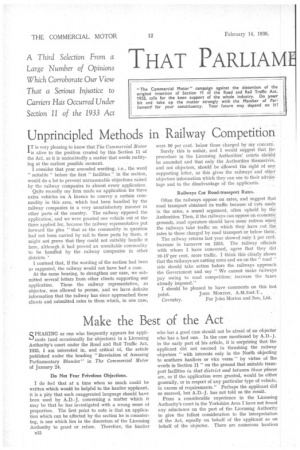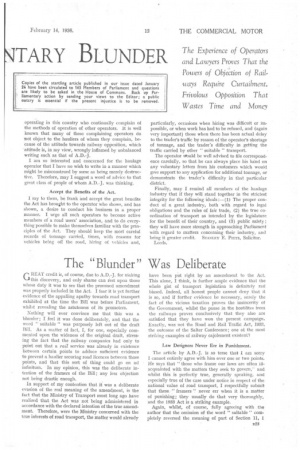Make the Best of the Act
Page 32

Page 33

If you've noticed an error in this article please click here to report it so we can fix it.
PEAKING as one who frequently appears for appli
cants (and occasionally for objectors) in a Licensing Authority's court under the Road and Rail Traffic Act, 1933, I am interested in, and critical of, the article published under the heading "Revelation of Amazing Parliamentary Blunder" in The Commercial Motor of January 24,
Do Not Fear Frivolous Objections.
I do feel that at a time when so much could be written which would be helpful to the haulier applicant, it is a pity that such exaggerated language should have been used by A.D.-J. concerning a matter which it may be that he has investigated with a wrong sense of proportion. The first point to note is that an application which can be affected by the section he is considering, is one which lies in the discretion of the Licensing Authority to grant or refuse. Therefore, the haulier
n22
who has a good case should not be afraid of an objector who has a bad one. In the case mentioned by A.D.-J. in the early part of his article, it is surprising that the applicant did not succeed in thrashing the railway objectors "with interests only in the North objecting to southern hauliers or vice versa" by virtue of the words in Section 11 " on the ground that suitable transport facilities in that district and between those places are, or if the application were granted, would be either generally, or in respect of any particular type of vehicle, in excess of requirements." Perhaps the applicant did so succeed, but A.D.-J. has not told us the result.
From a considerable experience in the Licensing Authority's court in the Yorkshire Area I have not found any reluctance on the part of the Licensing Authority to give the fullest consideration to the interpretation of the Act, equally on behalf of the applicant as on behaLf of the objector. There are numerous hauliers
operating in this country who continually complain of the methods of operation of other operators. It is well known that many of these complaining operators do -not object to the hauliers of whom they complain, because of the attitude towards 'railway opposition, which "attitude is, in my view, wrongly inflamed by unbalanced writing such as that of A.D.-j.
I am so interested and concerned for the haulage operator that I have no wish to write in a manner which might be misconstrued by some as being merely destructive. Therefore, may I suggest a word of advice to that great class of people of whom A.D.-J. was thinking.
Accept the Benefits of the Act.
I say to them, be frank and accept the great benefits the Act has brought to the operator who shows, and has shown, a desire to conduct his business in a proper manner. I urge all such operators to become active members of a road users' association, and to do everything possible to make themselves familiar with the principles of the Act. They should keep the most careful records of tonnage carried, times, with reasons for vehicles being off the road, hiring of vehicles and,
particularly, occasions when hiring was difficult or intpossible, or when work has had to be refused, and (again very important) those when there has been actual delay to the trader's traffic by reason of the operator's shortage of tonnage, and the trader's difficulty in getting the traffic carried by other " suitable" transport.
The operator vilbuld be well advised to file correspondence carefully, so that he can always place his hand on any voluntary letters from his customers which would give support to any application for additional tonnage, or demonstrate the trader's difficulty in that particular district,
Finally, may I remind all members of the haulage industry that if they will stand together in the strictest integrity for the following ideals e.--(1) The proper conduct of a great industry, both with regard to legal obligations and the rules of fair trade, (2) the true coordination of transport as intended by the legislature for the benefit of their country, and (3) public safety ; they will have more strength in approaching Parliament with regard to matters concerning their industry, and
bring it greater credit. STANLEY E. PITTS, Solicitor. Leeds.




















































































